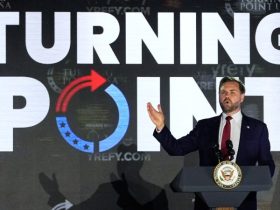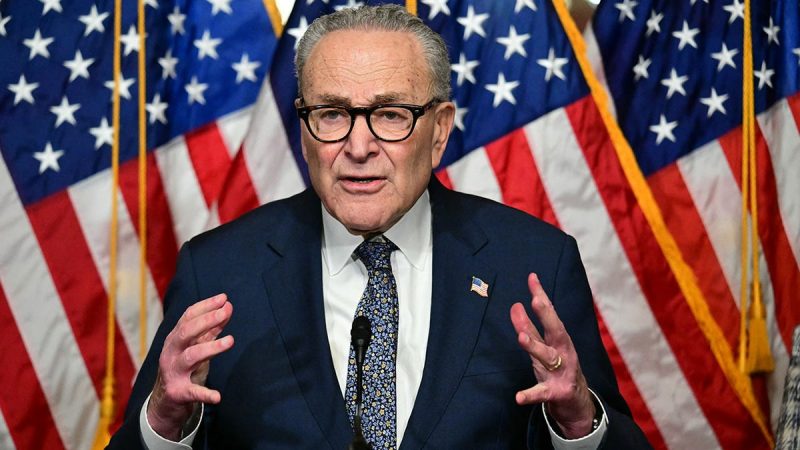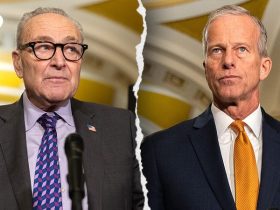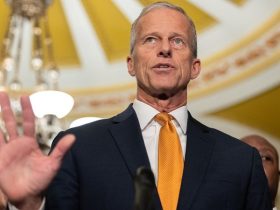Senate Democrats blocked Republicans’ attempt to reopen the government for a 14th time, all but ensuring that the government shutdown becomes the longest in U.S. history.
The move to again reject the House-passed continuing resolution (CR) comes as winds of optimism and exhaustion have swept through the upper chamber. Lawmakers are engaging in more bipartisan talks, and more believe that an off-ramp is in sight.
Still, Tuesday morning’s vote against the CR came as the shutdown matched the previous 35-day record set in 2019, and it all but ensured that it would surpass that unfortunate milestone later on in the evening.
Senate Minority Leader Chuck Schumer, D-N.Y., and his Democratic caucus are still largely entrenched in their position that unless an ironclad deal on expiring Obamacare subsidies is struck, they won’t reopen the government.
During a speech on the Senate floor, Schumer squarely placed the blame for the healthcare issue on Republicans and President Donald Trump as Americans got notices of increased premiums over the weekend.
‘The only plan Republicans have for healthcare seems to be to eliminate it, and then to tell working people to go figure it out on their own,’ he said. ‘That’s not a healthcare plan. That’s cruel.’
However, his caucus’ resolve showed signs of weakening on Monday, when a group of nearly a dozen Senate Democrats met behind closed doors to discuss a way out.
Senate Majority Leader John Thune, R-S.D., said he was optimistic about the shutdown coming to an end soon, but he wasn’t confident that it would be by the end of this week.
He noted that Republicans have made a plethora of options available to Senate Democrats, including guaranteeing a vote on the expiring subsidies, or ‘whatever their Obamacare bill is,’ after the government reopens. When asked if he believed lawmakers were close to reaching an end, he said, ‘I hope close.’
‘But the pressures, the cross pressures that everybody’s feeling, are great,’ Thune said. ‘But I think there are people who realize this has gone on long enough and that there’s been enough pain inflicted on the American people, and it’s time to end it. So we’ll see whether that’s, you know, sufficient numbers are there.’
Then there’s the reality that the current end date of Nov. 21 for the House-passed CR doesn’t give lawmakers enough time to advance funding bills, which has been a primary objective for Thune and others. And, many don’t want to reopen the government just to see it close back down a few weeks later.
Lawmakers are mulling extending the current CR, either by amending it or with a new bill, which would give them enough time to finish spending bills and avoid a colossal, year-end omnibus spending bill. Some are eyeing January, while others would prefer an extension into December. A trio of spending bills, known as a minibus, could also be tied to the revamped extension.
Those talks are happening parallel to discussions on Obamacare, but neither side has so far made a move to fully construct an off-ramp out of the shutdown.
When asked if he believed that the shutdown could end this week, Sen. Mike Rounds, R-S.D., who has routinely engaged in bipartisan talks since the shutdown began, said, ‘I don’t know, I hope so.’
‘Bottom line is they can stop all this with one vote and get back into it and get back to work on a bipartisan basis,’ he said. ‘Again, that’s what we’re hoping.’
Both sides recognize that changing the subsidies, either through reforms or impacting the rates, will be difficult given that insurers already released rates and guidance over the weekend in line with the start of open enrollment.
Still, lawmakers are discussing a path forward on the subsidies. Sen. Lisa Murkowski, R-Alaska, who has been involved in bipartisan talks, said that her proposal for the subsidies would extend them for two years.
She noted that it would be, ‘Really, really hard to do any reforms right now,’ because the insurance rates had been released, and that her proposal was one of many in the mix.
Ultimately, it’ll come down to the right blend of ideas to build an off-ramp for the subsidies. Murkowski said that changing the income cap, which was eliminated when the subsidies were enhanced under former President Joe Biden, and changes to the low-cost premium contribution were just a couple ideas on the table.
‘There’s no highly brand-new thing that anybody’s really talking about,’ she said. ‘It’s just what’s the right concoction?’
But some Senate Democrats are frustrated that Trump has not gotten more involved and argue that unless he gives an explicit greenlight, any deal crafted on the Hill doesn’t matter.
Trump has agreed to meet with Schumer and House Minority Leader Hakeem Jeffries, D-N.Y., only after the government reopens. And over the weekend, he demanded that Senate Republicans nuke the 60-vote filibuster threshold, something that is unlikely to happen any time soon, if ever.
‘At no point since Oct. 1 has Donald Trump agreed to sit down with Democratic leaders,’ Sen. Andy Kim, D-N.J., said. ‘So, he can talk all he wants about the filibuster, but until he actually puts some skin in the game and sits down and talks to us, like, that is all meaningless to me. And I honestly, like, don’t care about him pontificating this stuff on social media. Like, if he’s got time to tweet, he’s got time to just come and talk to us.’













